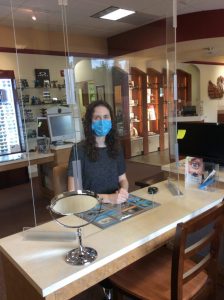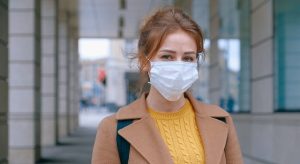While many people are careful to protect their nose and mouth to avoid catching COVID-19, it is important to remember that our delicate eyes need protection as well.
Here are our top 7 tips to keep your eyes healthy during the COVID-19 pandemic:
1. Practice healthy screen time habits
The pandemic and its social restrictions has led to a rapid rise in digital device usage. Whether you are working or learning from home, or just planning online ‘get-togethers’ with your friends, increased screen time can have a major effect on your eyes.
Practicing healthy screen time habits can help to reduce your risk of dry eye and digital eye strain.
Studies show that our blink rate decreases as we stare at a computer screen, often resulting in dry, irritated eyes, as well as blurry vision.
Digital eye strain, which causes headaches, eye fatigue and neck and shoulder pain, is another prevalent concern.
Tips for healthy screen time habits:
1. Adjust screen distance
Keep your screen between 40 and 70 cm away from your eyes, pointing it slightly downward, below eye level.
2. Schedule screen breaks
Set an alarm to go off every 20 minutes to give your eyes a much needed break. This will give the focusing muscles in your eyes a chance to relax, preventing eye strain and fatigue.
3. Modify screen contrast and brightness
Match your screen brightness and contrast to your environment to make it easier on your eyes, and avoid placing your screens in front of a window to prevent glare.
In darker environments, set your screen on the night mode feature which will automatically adjust the brightness, color and contrast of your screen to make it most comfortable for your eyes.
2. Drink water to combat dry eyes
Drink at least six 8-ounce glasses of water each day to keep your body healthy, prevent dehydration and reduce your risk of dry eye.
Daily mask wearing has become the new ‘norm’ since the start of the pandemic. However, prolonged mask wearing has been shown to increase the risk of dry eye, especially when the mask doesn’t fit securely against the bridge of your nose.
When the air you exhale escapes through the top of the mask, it rises toward the eyes, leading to excessive tear evaporation and dry eyes.
If you are experiencing mild to moderate dry eye symptoms, try using an over-the-counter artificial tears eye drop, gel or ointment to alleviate your discomfort. For more severe dry eyes, consult with your eye doctor, as there are a range of dry eye treatments that can give you the relief you seek.
3. Perform eye exercises
The following eye exercises can help relax your eye muscles, preventing eye strain and headaches in the long run.
Figure-eight
- Look downward and focus your eyes on something 10-15 feet away
- Trace a figure-eight with your eyes for 30 seconds
- Reverse directions
- Repeat twice
Moving near-vision focus
- Hold your finger an inch away from your eyes
- Focus on your finger
- Maintain focus while you slowly distance your finger until you reach arm’s length
- Take a break for 10 seconds
- Refocus your eyes toward your finger at arm’s length
- Maintain focus as you slowly bring your finger to its original position
- Repeat several times
Moving distance focus
- Focus on an object about a foot away
- Slowly shift your focus to an object 15 to 20 feet away
- Repeat several times
SEE RELATED: COVID Masks Causing Dry Eyes?
If you have noticed any changes in your vision, contact an eye doctor near you.
4. Wash hands
Keep your hands clean and germ-free with frequent hand washing.
Hand washing is crucial when it comes to preventing the spread of viruses.
Research has shown that the coronavirus can be detected in the conjunctiva, the clear covering of the front of the eye, but there is no conclusive evidence the virus can spread from the eye to the lungs.
Either way, it is still important to always wash your hands before touching your eyes, as this can prevent bacteria and viruses from infecting your delicate eyes.
5. Be cautious with your contact lenses
Wash your hands with soap and water before inserting or removing your lenses.
Contact lens hygiene is essential for protecting your eye health. Bacteria and viruses can stick to the surface of your contact lenses and threaten to cause infection.
To avoid contact lens complications, wear your contact lenses only as long as they are intended to be worn, and not past their expiration date — monthlies should be discarded monthly and dailies should be discarded daily.
6. Eat an ‘eye-healthy’ diet
Fuel your body with good, wholesome foods to boost your immune system and keep your eyes healthy.
Try to incorporate some of these nutrients into your daily meals:
Omega-3 fatty acids
Fish, such as salmon and tuna are high in omega-3, and can help to prevent dry eye while lowering your risk of macular degeneration and glaucoma.
Vitamins C and E
Kale, spinach and other dark leafy greens, are high in vitamins C and E, and can lower your risk of cataracts and age-related macular degeneration.
Vitamin A
Orange-colored fruits and vegetables, such as cantaloupe, carrots and sweet potatoes contain high levels of vitamin A which can help improve your night vision.
7. Visit your eye doctor
Schedule regular eye exams with your eye doctor, even if it means wearing a mask and keeping hand sanitizer in your back pocket!
Annual eye exams are essential for maintaining eye health and are crucial when it comes to early detection of eye disease.
LEARN MORE: Guide to Eye Conditions
If you have noticed any changes in your vision or are due for an eye exam, contact an eye doctor near you.
While many people are careful to protect their nose and mouth to avoid catching COVID-19, it is important to remember that our delicate eyes need protection as well.
Here are our top 7 tips to keep your eyes healthy during the COVID-19 pandemic.









